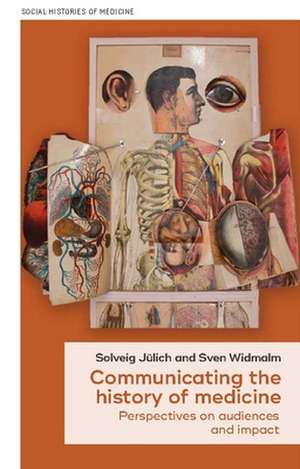Communicating the History of Medicine: Social Histories of Medicine
en Limba Engleză Hardback – 14 noi 2019
Din seria Social Histories of Medicine
- 14%
 Preț: 551.78 lei
Preț: 551.78 lei - 5%
 Preț: 233.76 lei
Preț: 233.76 lei - 5%
 Preț: 424.65 lei
Preț: 424.65 lei - 5%
 Preț: 119.62 lei
Preț: 119.62 lei - 23%
 Preț: 536.73 lei
Preț: 536.73 lei - 5%
 Preț: 235.47 lei
Preț: 235.47 lei - 5%
 Preț: 702.62 lei
Preț: 702.62 lei - 23%
 Preț: 568.45 lei
Preț: 568.45 lei - 5%
 Preț: 195.42 lei
Preț: 195.42 lei - 5%
 Preț: 236.69 lei
Preț: 236.69 lei - 5%
 Preț: 197.22 lei
Preț: 197.22 lei - 5%
 Preț: 700.00 lei
Preț: 700.00 lei - 5%
 Preț: 436.16 lei
Preț: 436.16 lei - 23%
 Preț: 537.06 lei
Preț: 537.06 lei - 5%
 Preț: 196.47 lei
Preț: 196.47 lei - 5%
 Preț: 197.66 lei
Preț: 197.66 lei - 5%
 Preț: 702.82 lei
Preț: 702.82 lei - 5%
 Preț: 198.16 lei
Preț: 198.16 lei -
 Preț: 207.40 lei
Preț: 207.40 lei - 5%
 Preț: 700.70 lei
Preț: 700.70 lei - 5%
 Preț: 703.20 lei
Preț: 703.20 lei - 5%
 Preț: 340.78 lei
Preț: 340.78 lei - 5%
 Preț: 959.94 lei
Preț: 959.94 lei - 5%
 Preț: 327.80 lei
Preț: 327.80 lei - 23%
 Preț: 721.44 lei
Preț: 721.44 lei - 5%
 Preț: 990.33 lei
Preț: 990.33 lei - 23%
 Preț: 722.03 lei
Preț: 722.03 lei - 23%
 Preț: 903.93 lei
Preț: 903.93 lei - 23%
 Preț: 756.92 lei
Preț: 756.92 lei - 5%
 Preț: 330.17 lei
Preț: 330.17 lei - 5%
 Preț: 291.29 lei
Preț: 291.29 lei - 5%
 Preț: 326.13 lei
Preț: 326.13 lei - 5%
 Preț: 289.55 lei
Preț: 289.55 lei - 5%
 Preț: 344.81 lei
Preț: 344.81 lei - 5%
 Preț: 895.94 lei
Preț: 895.94 lei - 5%
 Preț: 895.22 lei
Preț: 895.22 lei - 5%
 Preț: 893.57 lei
Preț: 893.57 lei - 5%
 Preț: 889.94 lei
Preț: 889.94 lei - 5%
 Preț: 1030.46 lei
Preț: 1030.46 lei - 5%
 Preț: 960.84 lei
Preț: 960.84 lei - 23%
 Preț: 722.51 lei
Preț: 722.51 lei - 23%
 Preț: 568.35 lei
Preț: 568.35 lei
Preț: 888.08 lei
Preț vechi: 934.83 lei
-5% Nou
Puncte Express: 1332
Preț estimativ în valută:
169.93€ • 177.42$ • 140.64£
169.93€ • 177.42$ • 140.64£
Carte tipărită la comandă
Livrare economică 04-18 aprilie
Preluare comenzi: 021 569.72.76
Specificații
ISBN-13: 9781526142467
ISBN-10: 1526142465
Pagini: 248
Dimensiuni: 138 x 216 x 26 mm
Greutate: 0.43 kg
Editura: MANCHESTER UNIVERSITY PRESS
Seria Social Histories of Medicine
ISBN-10: 1526142465
Pagini: 248
Dimensiuni: 138 x 216 x 26 mm
Greutate: 0.43 kg
Editura: MANCHESTER UNIVERSITY PRESS
Seria Social Histories of Medicine
Descriere
Communicating the History of Medicine offers a collection of case studies on academic outreach from historical and current perspectives. It questions the kind of linear thinking often found in policy or research assessment, instead offering a nuanced picture of both the promises and pitfalls of engaging audiences for research in the humanities. -- .
